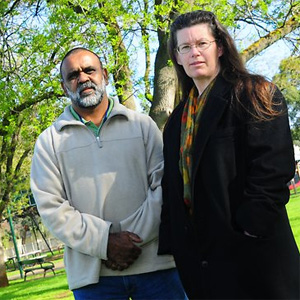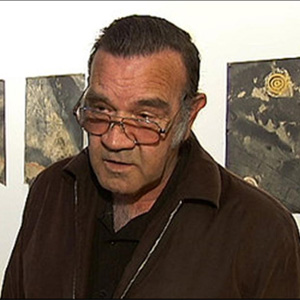Aboriginal group challenges constitution

Karno Walker with Kelly Henderson (Advertiser)
Joanne Fosdike Murray Valley Standard 17 December 2012
A group of Aboriginal people from Kingston, in the State's south east, and the Coorong and River Murray is challenging the Australian Constitution in a case that could see it apply for sovereignty status before the United Kingdom Privy Council.
The case of Ramindjeri versus State of South Australia and Ngarrindjeri went before the National Native Title Tribunal in the Federal Magistrates Court in South Australia on Friday to ask the court to recognise the Ramindjeri as the true owners of the land and one of many sovereign groups belonging to the area.
The fight was taken to court after State Government leaders refused to sit down with Ramindjeri leaders to hear their claim that Aboriginal families calling themselves Ngarrindjeri were ruling the area but were not tied to the land by blood or stories.
Ramindjeri spokesman and tribal leader Karno Walker said Ngarrindjeri was a Ramindjeri word meaning "black fellow of country" which was chosen by missionaries at the time to describe Aboriginal people living in the area.
He said the term was adopted by a group of Aboriginal people who came to the area from Victoria and New South Wales after they were dispersed to missions in South Australia.
Mr Walker said it meant the Ngarrindjeri was not a clan or a nation and therefore, in a legal sense, had no right to native title claims.
Even though the court case has been adjourned until April 5, Mr Walker said the Federal Court recognised it did not have jurisdiction over the matter of the Ramindjeri claim for sovereignty and it was suggested they take it before the Privy Council.
Ramindjeri man Mark Koolmatrie said an application to be heard by the Privy Council had already been made and they expected to have a hearing date early next year.
"We hope the Privy Council people recognise us and that they recognise what we are saying - that we are separate nations not one big nation and that there were kings and queens of each group.
"We don't want to take away the livelihoods of people or their houses, we just want to be recognised as the tribal owners of the land."
University of South Australia law school professor Rick Sarre said if the case made it to the Privy Council it would raise some interesting questions because it meant the Ramindjeri were claiming not to be Australian citizens.
He said in 1975, Gough Whitlam took away the right for Australian citizens to appeal to the Privy Council after a High Court ruling; and a loophole which allowed people to appeal if they bypassed the High Court was closed in the late 1980s.
Mr Sarre said it was possible the group would get an initial hearing from a Privy Council judge who would then decide if the claim had enough merit to go before the five Privy Council members.
He said he doubted the case would make it to the second stage as it would have major implications, not only across Australia but throughout Commonwealth nations.
"It is a good anthropological argument," he said.
"It is a very interesting angle but I am not sure the Privy Council is as adventuresome as the Ramindjeri would like.
"I would be delighted to be proven wrong."
Mr Walker and Mr Koolmatrie said the court challenges could have been avoided if South Australian Premier Jay Weatherill and Aboriginal Affairs Minister Paul Caica had agreed to sit down and talk with the Ramindjeri about issues including their claim the Government favoured Ngarrindjeri while ignoring the Ramindjeri.
Native Title claim causes offence

Tom Trevorrow (ABC News)
Joanne Fosdike Murray Valley Standard 20 december 2012
The Ngarrindjeri Regional Authority (NRA) says statements made against the rightful existence and ties to country of the Ngarrindjeri by a group of Ramindjeri Aborigines were offensive.
NRA chairman Tom Trevorrow said statements made by Ramindjeri spokesman Karno Walker in an article in The Standard on Tuesday were incorrect.
He said the native claims made in the Federal Court on Friday denied the existence of the Ngarrindjeri and caused great offence to those living today and their ancestors.
"The Ngarrindjeri have occupied and managed their lands and waters for thousands of years," Mr Trevorrow said.
"Since colonisation the Ngarrindjeri have fought hard to maintain their culture and many Ngarrindjeri have died without knowing whether their children will be safe or whether their culture, heritage and beliefs will be recognised and protected no matter which group they come from within Ngarrindjeri lands and waters.
Mr Trevorrow said the Ngarrindjeri would continue to survive regardless of what people said or would like to see happen.
"Ill-thought out actions are not the way to progress genuine Native Title claims or justice around issues of sovereignty and the 1836 Letters Patent issued by King William IV," he said.
Mr Trevorrow said the Ramindjeri Native Title Claim covered almost all of metropolitan Adelaide, Kangaroo Island and a third of the Ngarrindjeri people's claim and had already been rejected by the Native Title Tribunal.
A State Attorney General's Department spokesperson said the Government was not surprised by the Ramindjeri Native Title Claim but said it would be up to the court to decide if the claim for rightful ownership of the land, from an anthropological point of view, was valid.
"The hearing was in relation to an application by the State to strike out the claim for failing to comply with the requirements of the Native Title Act," the spokesperson said.
"The Government was not surprised, the group had foreshadowed the claim for many years and it is one of 22 current native title claims across the State."
The spokesperson did not say why Premier Jay Weatherill and Aboriginal Affairs Minister Paul Caica had refused an audience with Ramindjeri representative and tribal leader Karno Walker but said Mr Walker had been contacted by relevant Government officers regarding the matters.
"Mr Walker asserts he represents the Ramindjeri and seeks recognition of native title rights and interests." the spokesperson said.
"Many of the persons listed as claimants in his claim are listed as claimants in either or both of the pre-existing, and overlapping, Ngarrindjeri and Kaurna Native Title claims.
"Mr Walker is seeking orders for those overlapping claims to be withdrawn to the extent of the overlap."
The case of the Ramindjeri versus the State of South Australia and Ngarrindjeri began in Adelaide on Friday in the National Native Title Tribunal in Federal Court and has been adjourned until April.
It is challenging the naming of the Ngarrindjeri as traditional land owners from Kingston, in the State's south east, to the Coorong and River Murray.
But the Ramindjeri are not pinning all their hopes of recognition on the Federal justice system.
The group have applied to the United Kingdom Privy Council to be recognised as sovereign owners of the land and hope for an initial hearing early next year.

